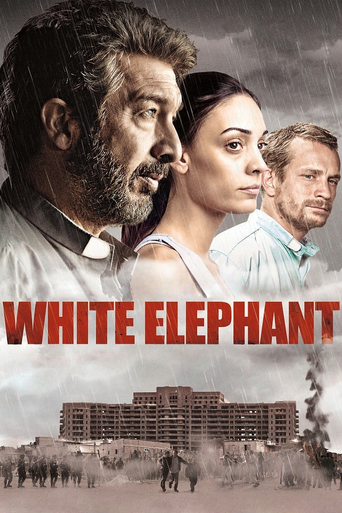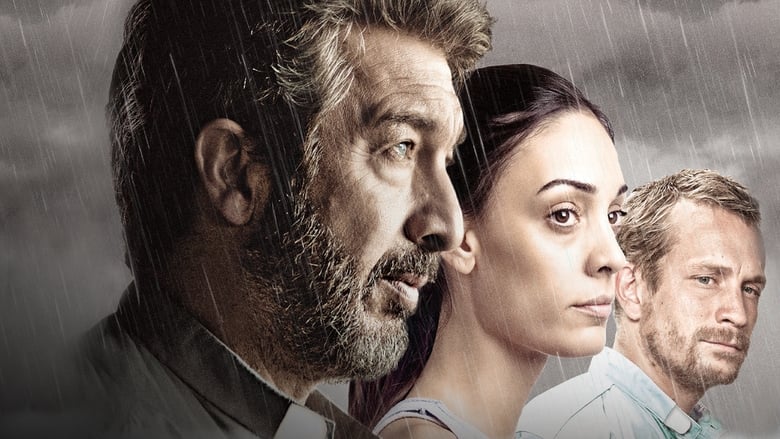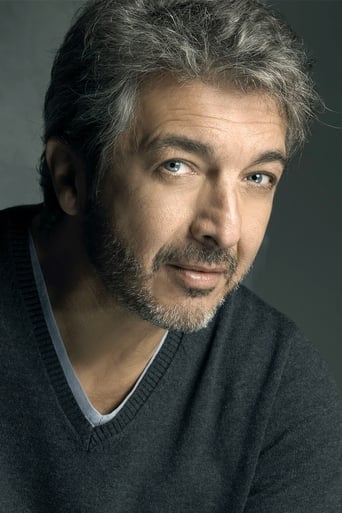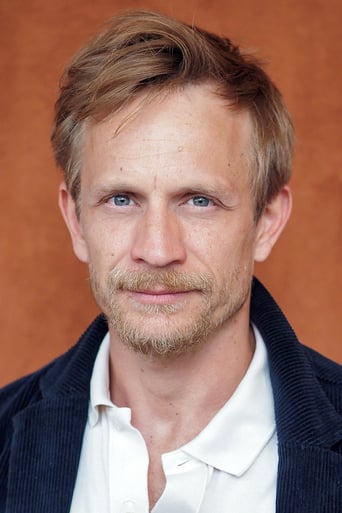

White Elephant (2013)
While working alongside his long-time friend and colleague in building a hospital for the residents of a Buenos Aries shantytown, a troubled priest finds solace in a young, atheist social worker.
Watch Trailer
Cast
Reviews
Sick Product of a Sick System
Clever, believable, and super fun to watch. It totally has replay value.
what a terribly boring film. I'm sorry but this is absolutely not deserving of best picture and will be forgotten quickly. Entertaining and engaging cinema? No. Nothing performances with flat faces and mistaking silence for subtlety.
It is neither dumb nor smart enough to be fun, and spends way too much time with its boring human characters.
There are two dominant symbols in the film that represent its major themes: the unfinished hospital that is the white elephant of the title and the murder of priests.An unfinished white building that was supposed to be a hospital and carried the ambitions of various Argentinian leaders to be the best hospital on the continent, has become the centre of a Buenos Aires slum. Surrounding the building are more make shift dwellings that house people and the community's chapel. On public land outside, building has begun on a project to provide new permanent homes for the slum dwellers, a community centre and, at the centre, a new church. This building is soon abandoned by the development company after its employees' wages fail to materialise. Who is responsible for paying the wages is not established amidst the bureaucracy. The community's anger when the work ceases boils over into a violent confrontation with the police that ends in fatality.A 'white elephant' is an expression for the evident presence of something ignored or not spoken about. As a symbol it is prevalent throughout the film and is a leitmotif. Other white elephants include the wealth of the Catholic church contrasted with its parishioners; the question of why a priest, as a representative of faith, cannot marry or have sexual relations yet can preach on these matters; the summary justice visited on the slum dwellers by authorities that mirrors the criminal behaviours they are there to prevent; and, the biggest white elephant of them all, why don't the elected leaders act? Why are the slum dwellers left poor? If they can make homes from nothing then why can't homes be made for them?The incomplete hospital represents the shifting and unsettled politics of Argentina with investment being provided and then withdrawn as the country's elected leaders changed. Thus the film can be viewed as a comment on the turbulent political sands of South America and the divide between wealthy and poor as much as on Argentina and Buenos Aires.The other symbol of the film is Father Carlos Mugica, a real life figure who, like the character of Father Julian (Ricardo Darin), hailed from an affluent background and devoted his religious life to the poor. Mugica was assassinated for his efforts by an anticommunist political group and this serves as a reminder of the high price leaders of the poor and disenfranchised can pay when society's paymasters feel threatened.The film opens in another South American country, Peru, where another poor community are being massacred as the authorities hunt for their priest, Father Nicolas (Jeremie Renier), who manages to elude capture. We do not learn what Fr Nicolas has done to invite such wrath but given what we see of Fr Nicolas later he was probably campaigning in an active way for his parishioners betterment, which was at odds with the authorities' wishes. During his convalescence he is visited by his colleague and confessor Father Julian who persuades him to return with him to Buenos Aires and help with the work the church are engaged in at the slum. Fr Nicolas's introduction to the reality of slum life hits him on his first night when the quiet is interrupted by gun fire and a pounding song on the soundtrack underlines how busy and noisy will be his new environment.The film's strength is its depiction and evocation of slum life. The director, Pablo Trapero, filmed in an actual Buenos Aires slum and many of the minor players and extras were from the local population. In spite of the poverty and crime the slum is shot in a way that shows its quirky beauty, the care of the people for their environment and its vitality.Contrasted to the pulsating slum life are the sterile and hierarchical meetings held by the church leaders with Fr Julian. One of the film's debates, explored via Fr Julian and Nicolas, is the issue of faith and its relationship, if any, with sinful behaviour. Remote and privileged, the religious leaders follow an orthodoxy that cannot adapt to the challenges faced by their priests in the slum and in this they fail their priests who are left to their own devices amidst the ensuing chaos. The actions of Fr Julian and Nicolas might be viewed as sinful but it seems equally sinful not to act, as is the decision made by the church leaders.One major criticism of the film is that its desire to be faithful to slum life makes the film very busy and more like a series of vignettes than a story following one or two characters. Indeed the main characters become symbols themselves rather than fleshed out people. On my first viewing I was left dissatisfied with the film as a result. A second viewing helped greatly as I was no longer concerned with plot and could focus instead on the themes and how characters and events contributed to them. Overall I think the film is a good one with strong acting, superb sense of place and time and a cracking soundtrack that contrasts popular music with orchestral pieces composed by Michael Nyman that are like dirges contributing to a prevailing sadness. Throughout the film mourns, without sentimentality, the plight of the slum dwellers and the losses in their lives and of those who try to help, as well as the loss of individual aspirations and hopes.Someone has described Trapero's films as muscular and that is a good way to view this film. It is strong and dynamic and encourages one to think about it and what is being portrayed.
'White Elephant' begins with a prologue about how Julian brings a younger priest Nicolas back to Buenos Aires. It also begins with Julian undergoing a scan, reminiscent of Kurosawa's 'Ikiru', a film about one man trying to make a small difference in the face of death. Both priests begin the film suffering in different ways. One physically from a terminal illness, only known to us the viewer (dramatic irony), and perhaps brought on by overwork/stress; the other, spiritually, from a guilt-ridden conscience after surviving a massacre which left his congregation dead.Two priests with different approaches: Julian is a latter-day St Francis of Assisi, a man who has given up his wealthy background to work in the slums and who tries to make a difference by battling political bureaucracy (inefficiency & indifference) & the hierarchy of his own church authorities, who appear more interested in 'talk' than action. Nicolas works on the front line, mediating between warring gangsters & working alongside his secular counterpart, a social worker, Luciana, with a mutual attraction developing between them.The 'White Elephant' of the film's title is a huge unfinished hospital, now occupied by drug addicts, and which acts as a metaphor for the stunted development of the slum as a whole- and the failure of a new smaller development (the workers go on strike after not being paid) emphasises the continued failure by the next generation of politicians to address these issues. As one reviewer put it well, it is as if the slum has also been 'forgotten' by God, too. And the people of the slum finally reach breaking point after yet more bureaucratic inefficiency leads them to taking matters into their own hands (to finish the development for themselves) and a confrontation with the authorities.The film adopts a visceral approach, more an edgy, fast-paced social drama than an examination of faith in, say, the poetic manner of Bresson. It contains a number of plots, such as the relationship between the two priests fighting crime, poverty and despair (including their own), a love story, the attempt to help a young delinquent as well as a social critique. Perhaps this is one of the flaws of the film. It contains too many plots and tries to cover so many issues, making it feel disjointed.For a film about priests, it didn't have many moments of 'transcendence', but it seemed, to me, to be more about what a priest/church should be in the 21st century & a damaged world.Instead, the film-maker, Trapero, imaginatively uses imagery to make biblical allusions. Candles/lights shining in darkness/at night, recall John 1:5 (The light shines in the darkness and the darkness has not overcome it); Nicolas' journey into a gangster's compound is literally 'a walk into the valley of the shadow of death'; and the young addict/delinquent, Monito, is 'a prodigal son'/lost sheep, sent to the church's 'farm' in an effort to lure him away from bad influences. The figure of Mary, Mother of Grace, to whom the priests pray for succour, has a dark counterpoint in a woman who is in charge of a rival neighbourhood gang.I actually think the film shows what the Catholic Church must do if it is remain relevant in the 21st century. That it must socially engage with those most in need & reminded me of a recent BBC4 programme on 'The Salvation Army', where pastoral work was described as 'the church outside four walls'. The Church cannot survive in seclusion (Nicolas is banished to a monastery at the end of the film), but must take sides (of the poor) and be socially engaged if it is to remain relevant. And, after all, did Christ not consort with the poor & the marginalised?Regarding the background to the film, it's interesting that the Catholic Church has since elected its first Latin American, and specifically Argentine, Pope who has a reputation for supporting the poor.The emphasis is less on 'sin', but on 'faith', as Nicolas utters during a service in the church, a faith based less on judging people and more on maintaining one's faith & hope in the darkness. This contrasts with the more cynical, bitter Cruz, a support worker who despairs at the pointlessness of it all (a plot twist reveals the truth about his 'exit').This is encapsulated in the behaviour of Nicolas himself. Who/what is a good man in a flawed world? Is a priest who swears, drinks, smokes & has sexual desires, a good man? Then, the answer is an overwhelming 'Yes'. The film does not judge its protagonist but rather shows Nicolas as a man who tries to do good, presenting a modern take on Christian (Catholic) values such as the issue of celibate priests. His relationship with Luciana is not purely sexual, but about a mutually supportive relationship based on love (a marriage in all but name).Gradually, Nicolas realises why Julian brought him to Buenos Aires. He experiences faith & doubt. Can he live up to the faith shown in him and live up to his responsibilities? As Luciana says: 'Leave? It's easier.'The ending was perhaps melodramatic as Julian tries to help Monito escape from the police, though Julian becomes a very modern martyr, reminiscent of the real-life figure of Fr Carlos Mugica, who worked in the slum and whose murder has never been solved.The film featured strong performances from all of the lead characters, Ricardo Darin as Julian, Martina Gusman as Luciana and it was interesting to see Jeremie Renier (The Child/Dardenne brothers), mature as an actor. I didn't recognise him from that earlier film.
Argentinean director Pablo Trapero brings to the screen a very dark seemingly hopeless disparity between the rich and the poor. Written by Trapero along with Alejandro Fadel, Martín Mauregui and Santiago Mitre, the story will burn on the viewer's mind the hypocrisy of disparity between the rich and the poor.The film opens in the Peruvian jungle where Father Nicolás (Jérémie Renier) witnesses the brutal massacre of his friends and congregation while he alone survives, leaving a profound sense of guilt for not having also died in the catastrophe. Father Nicolás's beloved friend and confessor Father Julián (Ricardo Darín) brings Nicolás to the "Villa Virgin", a 'favela' like shantytown in the slums of Buenos Aires near an abandoned huge project for a hospital that was started decades ago in Buenos Aires, seen today as a typical "white elephant", a useless structure that now houses the poverty stricken inhabitants. Drugs provide the major business in this ghetto. Assault weapons and firearms can be found almost everywhere. Add all that to the precarious living conditions and this sort of hell on earth is not even fit for anyone to endure. The two priests work tirelessly to help the local people. Julián uses his political connections to oversee the construction of a hospital. Nicolás remains deeply troubled from his experience in the jungle, but he does find comfort in Luciana (Martina Gusman), a young, attractive, atheist social worker. As Nicolás' faith weakens, tension and violence between the slum drug dealing cartels grows. And when work on the hospital is halted by ministerial decree, the faith of the inhabitants of Villa Virgin is shattered, and Nicolás discovers he has been called by Julián to assume his role of parish priest as Julián is coping with an undiagnosed neurological disease. It is a test of wills, a test of faith, and a sense of being crushed by the politics of Argentina.Because of the setting in the filthy and decrepit slum the visuals become confusing with the cinematography by Guillermo Nieto attempting to take in too much visual information to the point of confusing the story line. But the musical score by Michael Nyman is brilliant and enhances the film tremendously. The three major actors - Darin, Renier, and Gusman - are outstanding in very difficult roles. If the audience is left with a sense of the futility the people of the slums face daily, then the film has accomplished its mission. In Spanish with English subtitles. Grady Harp
Really disappointed me with a very weak argument, it seems that the film tries to portray only what we already know what happens in the villages. Images repetitive, almost exaggerated, about the inhuman conditions in which many people live in our country, make a documentary film class. Yes, it is impeccable filming, excellent cinematography, setting, and a way to shoot that turn the viewer into another resident of that place. Not so the music I think is another weak point because, beyond the issue of Pity Alvarez with which opens and closes the film, music that is heard is really bad.But the film fails because it fails to catch a solid script and with characters that are created in such a way to get in your skin. Darin always right but off other papers, it sticks Renier with authority about his character but the most important protagonist of the film seems to be the rain, constant, unbearable, identified as another of the many shrines that these people must suffer, suggests almost as God forgot that part of the world. In short, a movie not to miss, but it is far from being among the best of Trapero, of Darin, of the year of our cinema.


